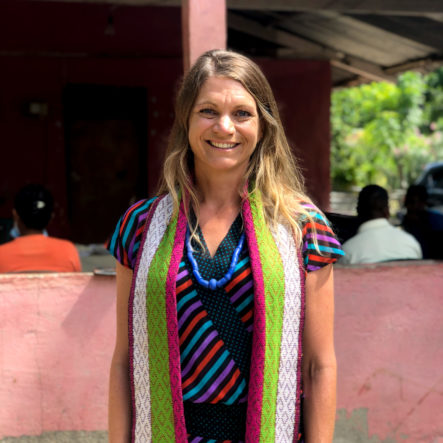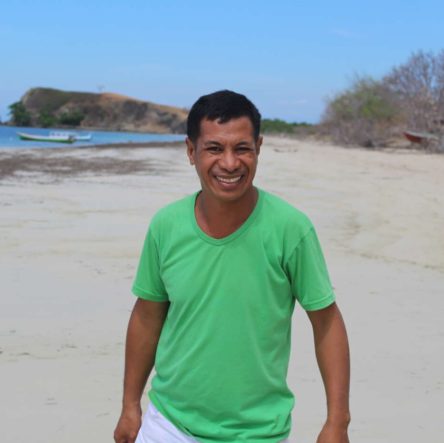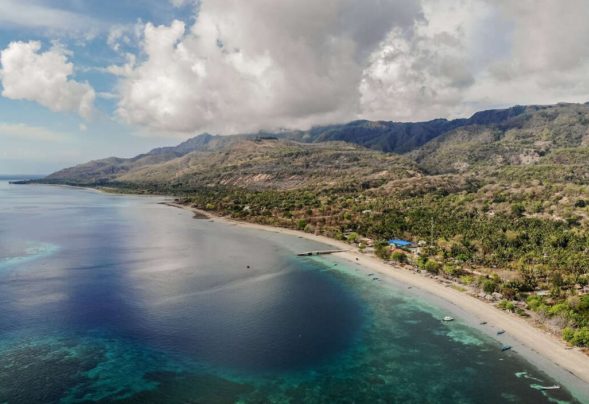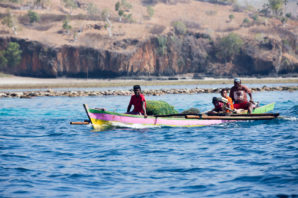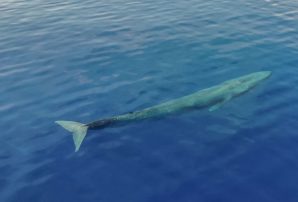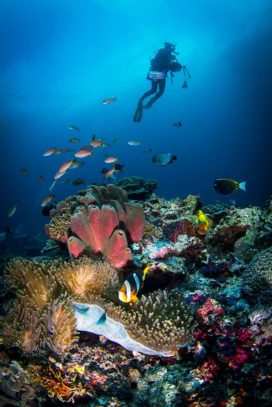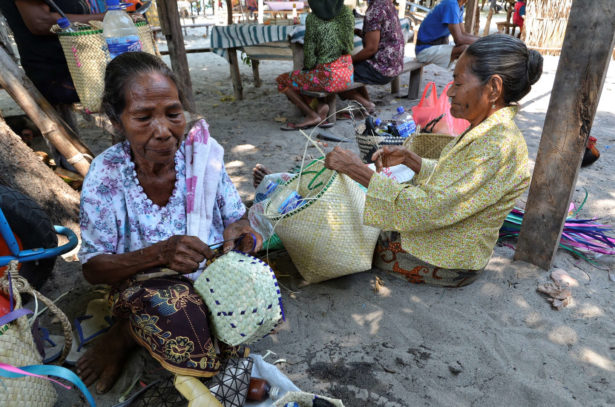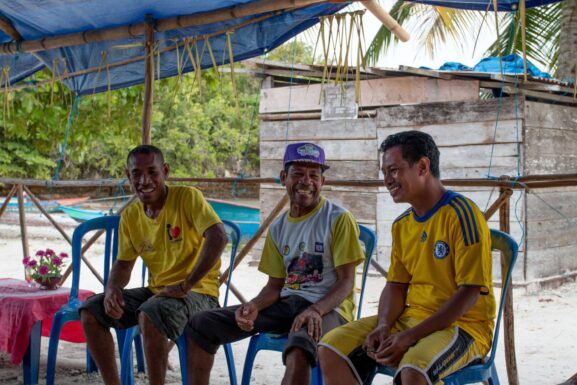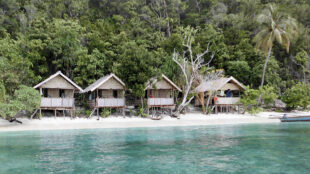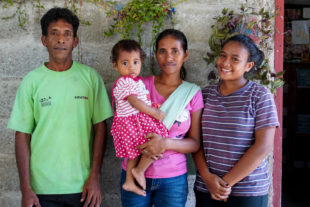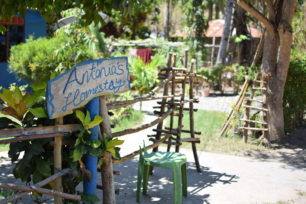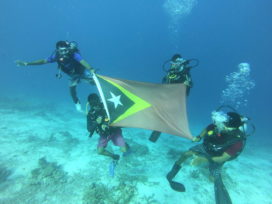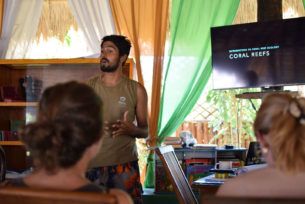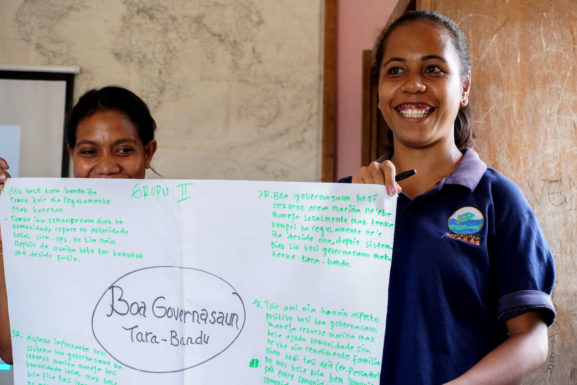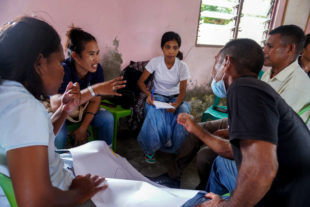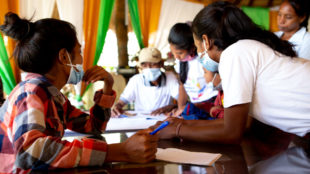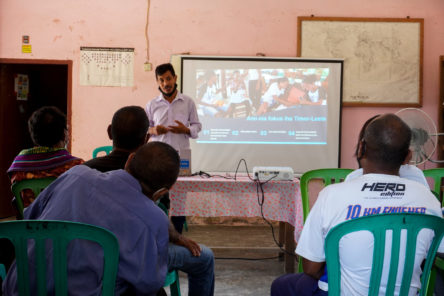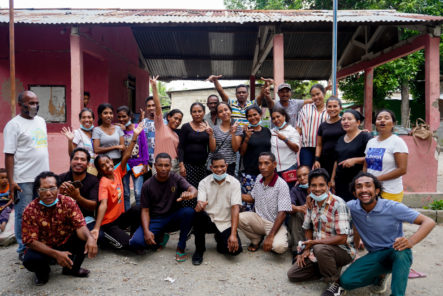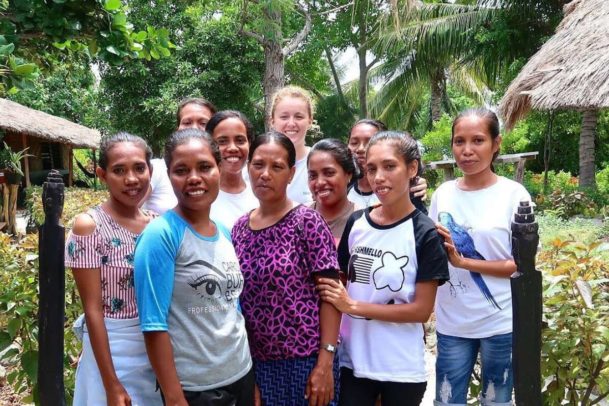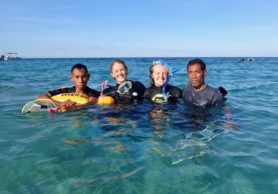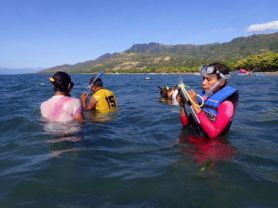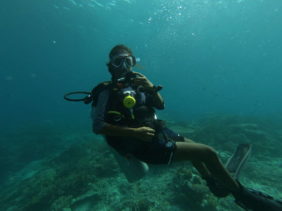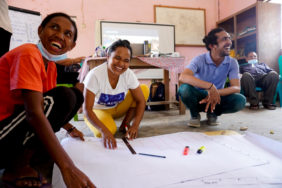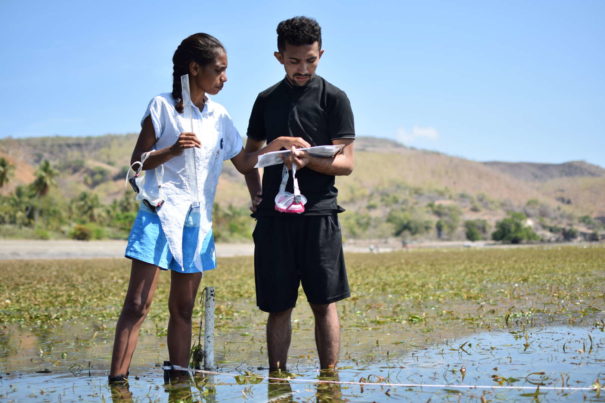Birgit: So Ollie, wow, it’s already five years! That’s a long time that Blue Ventures has been working in Timor-Leste. Can you still remember what the marine environment was like back then?
There was a limited understanding of marine conservation, and Blue Ventures became one of the first organisations trying to change this.Ollie: Well, there weren’t many organisations working in the marine area at that time. In fact, not many Timorese people had even seen beneath the ocean with their own eyes. There was a limited understanding of marine conservation, and Blue Ventures became one of the first organisations trying to change this.
Birgit: I remember, it was quite a different environment. Why did you join Blue Ventures, Ollie?
Ollie: A lot of Timorese people, especially coastal communities, live in a very harsh situation and they don’t know how to conserve their natural resources. So I joined Blue Ventures to help bring these communities together and raise their awareness of marine conservation.
Birgit: I agree, Ollie. I was in Timor-Leste when Blue Ventures started and I was surprised there weren’t more marine-focused organisations at that time, with the marine environment here being so unique. In fact, the waters around Timor-Leste recently achieved Hope Spot status, but there is very little awareness locally of the value of what’s in the ocean. So it made perfect sense for Blue Ventures to form roots in Timor-Leste.
And now here we are today, five years later. The other day I was looking through photos of the team at the very beginning; I spotted our colleague, Mima – she’s still here – but now the team is different and much bigger. There’s 14 of us and because of Covid-19, we aren’t running expeditions anymore, which is how Blue Ventures Timor-Leste initially began. The international volunteers assisted with the SCUBA-based reef monitoring and stayed in the island’s first homestays. How did the homestays come about, Ollie?
As well as providing a foundation for other local businesses to flourish, homestays provide an alternative income so that communities don’t have to fish so much, reducing pressure on the local marine ecosystem.Ollie: It’s a good question, Birgit. Our main aim was to generate a long-term income for the community. As well as providing a foundation for other local businesses to flourish, homestays provide an alternative income so that communities don’t have to fish so much, reducing pressure on the local marine ecosystem. We organised a learning exchange in Raja Ampat so community members from Atauro could learn how communities there were managing homestays; when we came back to Timor-Leste, families from Atauro were able to develop their own businesses based on what they’d learnt.
From this, the Atauro Homestay Association (AHA) was born. Over the years, many international volunteers enjoyed the delights of AHA, but of course, when Covid-19 hit, that all came to an end.
Birgit: Yes, unfortunately the pandemic meant that our expeditions were made dormant. But that’s not the end of the homestay story is it? We’ve since supported another community to establish a second homestay.
Ollie: Yes, and this time we’re focusing on domestic tourism. I’m really excited about the new homestay initiative that is happening in Beto-Tasi because it’s a great example of peer to peer learning. When the community of Beto-Tasi heard about the homestay on Atauro, they approached Blue Ventures and asked us to support them to establish their own homestay businesses.
So just like in Raja Ampat, we arranged an exchange, bringing community members from Beto-Tasi (which is just outside the capital, Dili) to visit Atauro for the first time. After two years of learning and development, families in Beto-Tasi opened their doors to their first Timorese homestay guests at the end of 2020. Hopefully in the future, they’ll be able to welcome international guests too.
For us, working closely with communities has always been the most important thing and our expeditions programme enabled us to live with the community and truly understand their way of life.Birgit: I hope so too! It’s true what you said about peer to peer learning – that’s something really unique about the way we work. For us, working closely with communities has always been the most important thing and our expeditions programme enabled us to live with the community and truly understand their way of life. This boosted our reputation in Timor-Leste and as you’ll remember, we were also approached by the community of Behau on the mainland. They wanted to learn more about marine conservation and fisheries management. After about a year of working with us, they established a locally managed marine area (LMMA) in 2018, or a Tara Bandu LMMA, as we call it here in Timor-Leste.
This story, along with the story about the Beto-Tasi homestays, shows just how much we’ve grown. We had a smaller team back in 2016 and weren’t able to respond to all of the enquiries from communities, but now we can; it’s really exciting to think about where we could be in another five years. But there have been difficulties along the way. What do you think has been our biggest challenge?
We’re now working with 12 different communities – with the help of over 100 community volunteers.
Ollie: I think the biggest challenge has been helping the communities to increase their awareness of marine conservation. In the beginning, they thought, why are Blue Ventures here? Why establish an LMMA? Why set up a homestay? They didn’t see the full picture of what we were trying to do and for many, there was no alternative to fishing – in fact, this is still true for many coastal communities, so our work here isn’t done. But overall, we are heading in the right direction. We’re now working with 12 different communities – with the help of over 100 community volunteers – to spark a movement of marine conservation and community-based ecotourism development in Timor-Leste.
Birgit: Exactly, Ollie. Take February, for example, when we had a small window of opportunity with eased Covid-19 restrictions; we organised our biggest ever community exchange, bringing nine of our partner communities together.
We bring our technical expertise, but when the communities have the opportunity to raise their voice, they are the ones who can really inspire change.
In the past five years, our biggest lesson has been that the best learning and impact happens when you bring coastal communities together because, at the end of the day, the communities know what they need best. We bring our technical expertise, but when the communities have the opportunity to raise their voice, they are the ones who can really inspire change.
Ollie: It’s so true. And the same is true when you think about our efforts to engage women in conservation.
Birgit: Exactly! Another important aspect of our work is the community fisheries monitoring (CFM) programme. We’re currently supporting three types of monitoring: fisheries monitoring, seagrass monitoring and SCUBA-based reef monitoring. From your perspective, what’s special about the CFM programme?
It’s amazing to see women making decisions on how to help their families and communities move forward.
Ollie: Firstly, it’s 100% done by community volunteers who are all women, which has had a huge impact on the mindset of these communities. Traditionally in Timor-Leste, women have no power to speak for themselves or on behalf of their community, especially in remote areas. Often, women stay at the back, but the CFM women are well and truly at the front. They present the data they collect back to their communities in meetings and can feel confident in making decisions about conservation because they are the ones who understand what’s going on in the water. It’s amazing to see women making decisions on how to help their families and communities move forward.
Birgit: I agree, and it’s not just within their own communities. The CFM groups have been approached to participate in national consultations for ocean policies, and women who run homestays have been invited to domestic tourism fairs and forums. Both groups are driving change beyond the community-level.
For Blue Ventures, we’re also scaling up our presence through our network of partner organisations. We have a relationship with the National University of Timor-Leste, (UNTL) where students are learning survey methodologies, as well as with Konserversaun Flora and Fauna (KFF), the Timorese-run conservation NGO. We are also one of the founding members of the Marine Tourism Association of Timor-Leste. Through networks and partnerships, we hope to spread enthusiasm about going in the water, growing understanding about what’s beneath the waves and aligning the needs of people and nature.
We’ve started training a Timorese-led SCUBA dive team to do reef monitoring – this is a huge step forward for marine conservation here.
Ollie: Speaking of going in the water, Birgit, there’s another great development that actually happened as a result of the closed borders; we’ve started training a Timorese-led SCUBA dive team to do reef monitoring – this is a huge step forward for marine conservation here. In the past, reef monitoring was mostly done by foreign volunteers and scientists, but now we are enabling Timorese people to do monitoring so that they can take ownership of their data and feed it back to other communities. In the last five years, this is one of the most exciting things we’ve done, and as a team we should feel really proud.
Birgit: I am so proud of our team too. It’s a really exciting time; we’re going to nurture the relationships we have, as well as develop more so that the reach of our programme can grow. Together, we’ll be able to empower more communities to manage their own ecosystems so that future generations are still able to fish, secure their livelihoods and build resilience to climate change. That’s the best way to prepare Timor-Leste’s coastal communities for what lies ahead.
Learn more about how Ollie led the Timor-Leste team throughout the Covid-19 pandemic
Read more from Birgit and her journey with the Rotary Peace Fellowship





